If you're building in-app chat, video, or moderation, you've likely come across CometChat. It's one of the more well-known in-app feature SDK providers, and for good reason.
But choosing the right real-time communication platform for your app isn't easy. With dozens of APIs promising fast integration and feature-rich toolkits, it can be challenging to pinpoint the best chat solution for your app. The best fit depends on your team's skillset, your product roadmap, and the level of customization and scalability you need.
To simplify your search, this guide breaks down the top 10 CometChat competitors and compares them head-to-head. You'll find overviews of each platform's strengths, limitations, pricing, and use cases.
Let's start with a closer look at Comet's product and positioning.
CometChat Overview
CometChat is a platform that helps developers integrate real-time communication features into their applications. Its offerings include 1:1 messaging, group chat, voice and video calling, message history, file sharing, and moderation tools.
Let's explore the pros and cons of its solution as well as its notable features, primary use cases, and pricing plans.
Advantages of CometChat
- Broad SDK and Platform Support: Comet offers SDKs for 12 platforms, including popular options like React, React Native, iOS, Android, and Unity, along with support for frameworks like Cordova and Ionic.
- UI Kits and No-Code Tools: The platform provides pre-built UI components and a no-code widget to help teams launch messaging features faster.
- Feature-Rich Communication: It supports standard messaging features like read receipts, typing indicators, push notifications, file uploads, and real-time presence. It also includes advanced capabilities such as message threading, voice notes, group video calls, conversation summarizers, and AI-driven smart replies.
- Industry-Specific Solutions: Comet tailors its feature set and messaging around specific verticals such as dating, telehealth, and education.
- Built-In Moderation and AI Tools: The platform includes moderation tools like profanity filters, user bans, and image moderation. AI-powered extensions enable features such as sentiment analysis, spam detection, and automated conversation summaries.
- Transparent Pricing for Mid-Scale Apps: Comet's pricing page includes a calculator that estimates monthly costs for apps with up to 50,000 monthly active users (MAU).
Drawbacks of CometChat
-
Activity Feeds: Unlike some competitors, Comet does not offer a dedicated SDK or API for building activity feeds. Apps that need both messaging and social feed functionality will need to integrate a separate solution or build that system in-house. This is a key consideration for social and community-driven apps, as activity feeds can increase engagement by up to 66%.
-
Pricing: While Comet is cost-effective for high MAU counts, overage costs of $0.10 per MAU and $1 per concurrent connection can make scaling less predictable.
-
Basic Integrations Outside of Chat: Comet's extensibility primarily focuses on chat-related features like translation, moderation, and smart replies. It lacks native integrations with backend infrastructure such as event streaming platforms (e.g., Kafka), serverless environments, or external databases, which can limit advanced workflows.
-
Enterprise Customization Requires Sales Involvement: Plans for apps with more than 50,000 MAU require custom pricing and sales contact. Teams needing enterprise-grade features or SLAs may face slower onboarding compared to fully self-serve platforms.
Main CometChat Features
CometChat organizes its core features into messaging, engagement, moderation, voice, video, and extensibility categories. Below is a breakdown of what each includes:
-
Message: 1:1 chat, group chat, message threading, typing indicators, read receipts, unread message counts, presence indicators, push notifications, and smart search.
-
Engage: Rich media (images, video, voice notes, GIFs), reactions, mentions, custom stickers, smart replies, translation, and conversation summaries.
-
Moderate: Profanity filtering, image moderation, user muting, banning, blocking, spam detection, abuse filters, and moderation dashboard.
-
Voice & Video: 1:1 and group voice/video calling, screen sharing, call recording, and anonymous calling.
-
Extend: 12 SDKs, pre-built UI kits, no-code widgets, extension marketplace, role-based access, and HIPAA/GDPR compliance.
Primary CometChat Use Cases
CometChat serves a variety of industries, including online marketplaces, dating apps, education, healthcare, social communities, and virtual events. These sectors can use Comet's APIs and SDKs in the following ways:
-
Marketplace Messaging: Enable real-time chat between buyers and sellers to reduce cart abandonment and build trust throughout the transaction process.
-
Dating Apps: Power private, secure conversations with features like anonymous calling, block/report functions, and user verification for a safer in-app experience.
-
Telehealth Communication: Offer HIPAA-compliant chat, voice, and video tools that allow patients and providers to connect securely, share files, and follow up post-visit.
-
EdTech Collaboration: Facilitate real-time discussions between students and teachers with threaded messages, group video calls, and smart moderation to keep conversations on track.
-
Social Community Building: Create vibrant user-to-user messaging experiences with rich media, reactions, and presence indicators that drive engagement.
-
Virtual Events: Boost interaction during online events through live group chat, Q&A channels, and real-time moderation for a polished attendee experience.
CometChat Pricing
CometChat prices its Chat and Voice/ Video Calling plans separately, with additional capabilities unlocked at higher tiers:
Chat & Messaging
Basic: Starts at $239/month for up to 1,000 MAU\
Advanced: Starts at $339/month for up to 1,000 MAU\
Enterprise: Custom pricing
Voice & Video Calling
Pay-as-you-go:
-
Voice calling: $0.001/ user minute
-
Video calling: $0.003/ user minute
-
Voice & video call recording: $0.006/ minute
Chat pricing estimates for up to 50,000 MAU are available directly on Comet's website using their cost calculator. Custom pricing for Chat, Voice, and Video Calling requires contacting sales.
What to Consider: CometChat Versus a Competitor
When comparing CometChat to other providers, it's important to assess which platforms offer more than just chat. If your app needs real-time messaging now—and voice, video, or moderation later—choosing a provider that supports all of these through a unified product suite can save you time and technical debt.
-
Messaging, Voice, & Video in One Platform: Instead of stitching together multiple vendors, look for a provider that offers chat, voice, and video products under one roof. This reduces integration complexity and ensures consistency in user experience, billing, and support.
-
Integrated Moderation Tools: Native tools for muting, banning, profanity filtering, and image moderation, ideally enhanced by AI, are key to keeping conversations safe and scalable.
-
Cross-Platform UI Kits: UI components for platforms like React, React Native, iOS, Android, and Flutter can accelerate frontend development and reduce inconsistencies. Choose a provider with strong, customizable UI support.
-
Scalability and Performance: Evaluate how well each provider handles large group chats, concurrent connections, and global traffic. Performance transparency, such as latency benchmarks and concurrency limits, is a plus.
-
Compliance and Security: If your app handles sensitive data (e.g., in healthcare or education), you'll need a provider that offers HIPAA/GDPR compliance, secure cloud infrastructure, and role-based access controls.
CometChat Versus Top 10 Competitors
CometChat vs. Stream
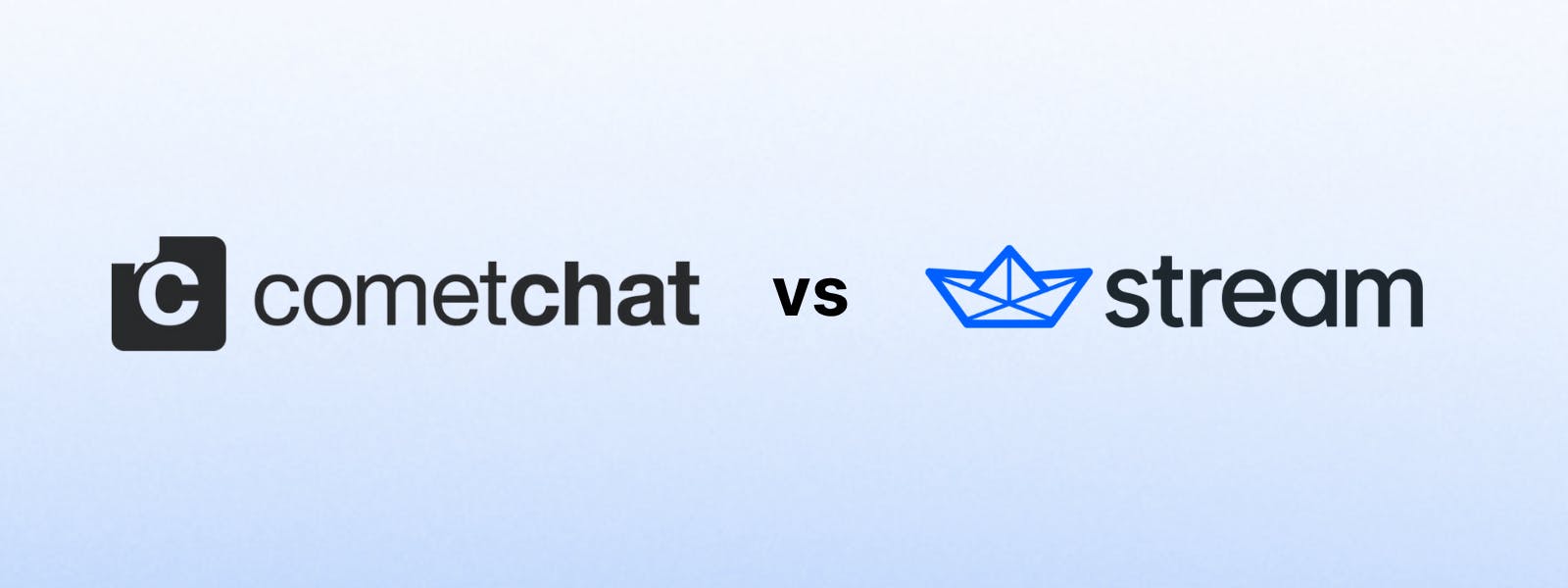
Both CometChat and Stream offer developer-friendly APIs and SDKs to help teams build in-app chat, voice, video, and moderation features quickly. If you're comparing the two, it's important to go beyond surface-level similarities. The best option depends on the scale, performance, and flexibility your app demands.
Stream provides a robust and customizable solution with backend APIs powered by Go, RocksDB, and Raft, feature-rich SDKs across platforms, and out-of-the-box UI kits.
Built with performance and scalability in mind, Stream also offers 24/7 customer support for Enterprise customers and detailed documentation to speed up development. The platform provides a 99.999% uptime SLA, is SOC 2 Type II and ISO 27001 certified, and is HIPAA compliant.
The most effective way to compare the two is to build a proof of concept using both platforms. Stream offers a free Maker plan to help you get started.
Stream Main Use Cases
-
Social & Team: Build highly interactive communities or team collaboration tools with chat, voice, and video support. Enable group messaging, reactions, and real-time presence to keep users engaged.
-
Virtual Events Deliver real-time chat and live audio/video interactions for attendees. Use Stream to power Q&A, backstage coordination, and social interaction during virtual conferences, webinars, and livestreams.
-
EdTech: Create a dynamic classroom experience by combining chat and video for student-teacher communication, live lessons, and study groups. Moderate interactions with built-in tools to maintain a safe learning environment.
-
Marketplace: Enable secure chat between buyers and sellers, with optional audio or video calling to help close sales faster. Use moderation and message history to maintain quality and trust.
-
Telehealth: Facilitate secure, HIPAA-compliant patient-provider communication through chat and future-ready voice/video capabilities. Share images, documents, and health data in real time.
-
Gaming: Enhance multiplayer experiences with in-game chat and live audio for team coordination, spectator interaction, and community building. Perfect for competitive play and livestream integrations.
-
Sports: Drive fan engagement during live matches with real-time chat, highlight reactions, and audio rooms. Stream enables rich fan interaction before, during, and after the game.
-
Dating: Help users build meaningful connections through private chat and optional video/audio calling. Safety features like moderation and message history support trust and accountability.
-
FinTech: Power real-time communication between customers and support agents or advisors via secure chat. Add optional voice/video to assist with onboarding, transactions, or high-touch support.
Stream Versus CometChat
-
Video Moderation: While Comet only supports chat moderation, Stream offers integrated moderation of text, images, and video for your app.
-
Chat Features: Stream includes advanced capabilities like slash commands, message states, and offline queuing.
-
Scalability and Reliability: Stream is one of the few platforms with support for SFU cascading. When paired with our global edge network and expansive worldwide coverage, users on Stream can benefit from low-latency calling and superior audio thanks to features like OPUS-Red and OPUS-DTX built directly into the API.
-
Unlimited Group Chat Participants: Stream has no cap on group chat size, while Comet's group size may be restricted based on plan and performance.
-
Cost Effectiveness: Stream's Standard plan includes features that may require a higher-tier plan with Comet. Stream offers more value at scale, especially for teams needing advanced moderation, performance, and customization.
Stream Pricing
Stream's Chat, Video & Audio, and Moderation are divided into unique plans based on monthly active users, with advanced features unlocked at higher levels.
-
Start: Starts at $399/month for up to 10,000 MAU
-
Elevate: Starts at $599/month for up to 10,000 MAU
-
Enterprise: Talk to Sales
-
Pay-As-You-Go: Starts at $0.30/month for 1,000 participant minutes
-
Enterprise: Talk to Sales
-
Starter: Starts at $5,000/ year for three moderators
-
Standard: Starts at $20,000/ year for five moderators
-
Enterprise: Talk to Sales
CometChat vs. Sendbird
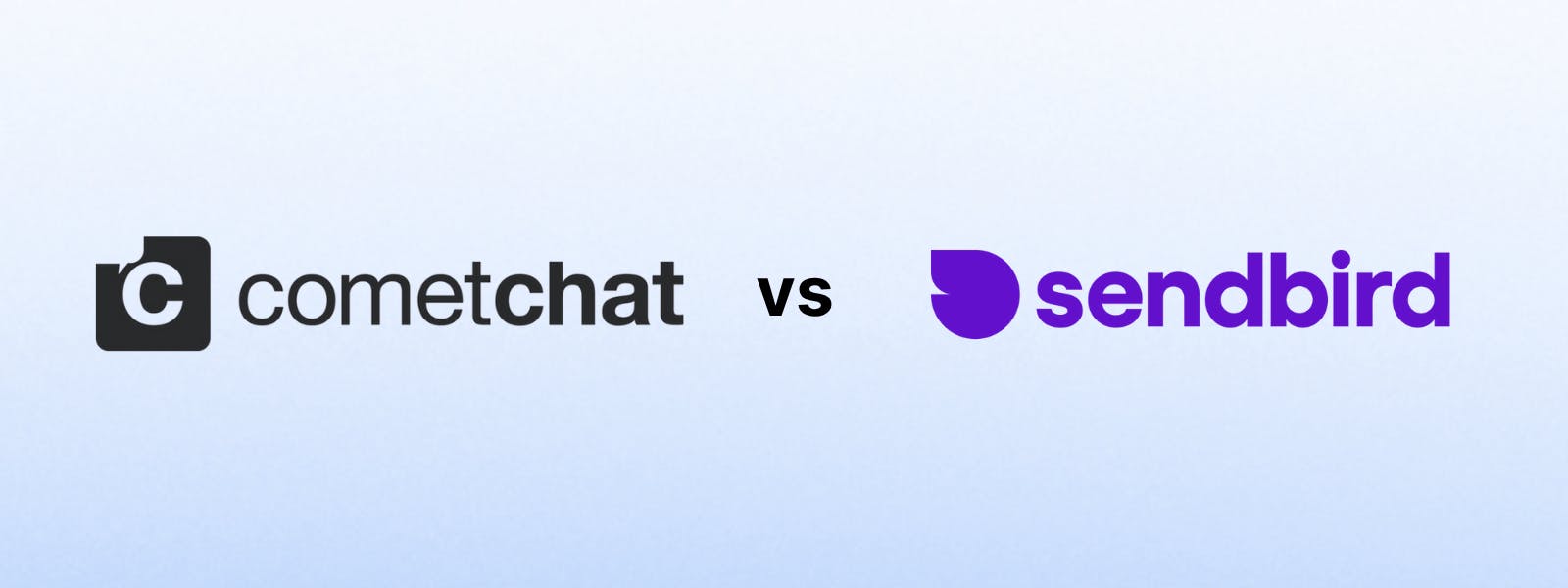
Sendbird is a real-time communication platform that offers chat, voice, and video APIs for web and mobile apps. It provides UI kits, moderation tools, and support for various industries, including social networking, marketplaces, healthcare, and on-demand services.
Sendbird Versus CometChat
Sendbird supports a similarly wide range of use cases as CometChat, covering everything from user-to-user messaging to operations and support chat across industries like financial services, retail, and digital health.
Both platforms offer rich messaging features such as group chat, media attachments, reactions, typing indicators, push notifications, and read receipts. Each also includes UI components to simplify frontend implementation, along with compliance features like HIPAA and GDPR support.
Where the platforms differ is in scale and infrastructure. Sendbird limits the number of group chat participants by default and requires developers to select a single data center region during app setup. While Sendbird now operates across eight global data centers, all traffic for a given app is still routed through the selected region by default. This can result in higher latency for users located far from the app's primary region unless you're on a custom or private cloud plan. Comet, while scalable, does not offer public benchmarks around concurrency performance, leaving some questions unanswered for high-scale apps.
Sendbird also offers a more mature documentation set and has broader third-party reviews and enterprise adoption. They maintain a 99.9% uptime SLA and support SOC 2 and ISO 27001. However, Comet stands out with its flexible pricing calculator, industry-specific extensions, and no-code options that make it accessible for teams of all sizes and technical backgrounds.
Sendbird Pricing
Sendbird Chat and Video are priced based on monthly active users. Plans include:
Chat Pricing:
-
Starter: Starting at $349/month for 5,000 MAUs
-
Pro: Starting at $499/month for 5,000 MAUs
-
Enterprise: Contact Sales
Video Pricing:
-
Peer-to-peer: $0.0014/ per minute
-
Server-relayed: $0.0035/ per minute
-
Cloud recording: $0.0059/ per minute
CometChat vs. Twilio
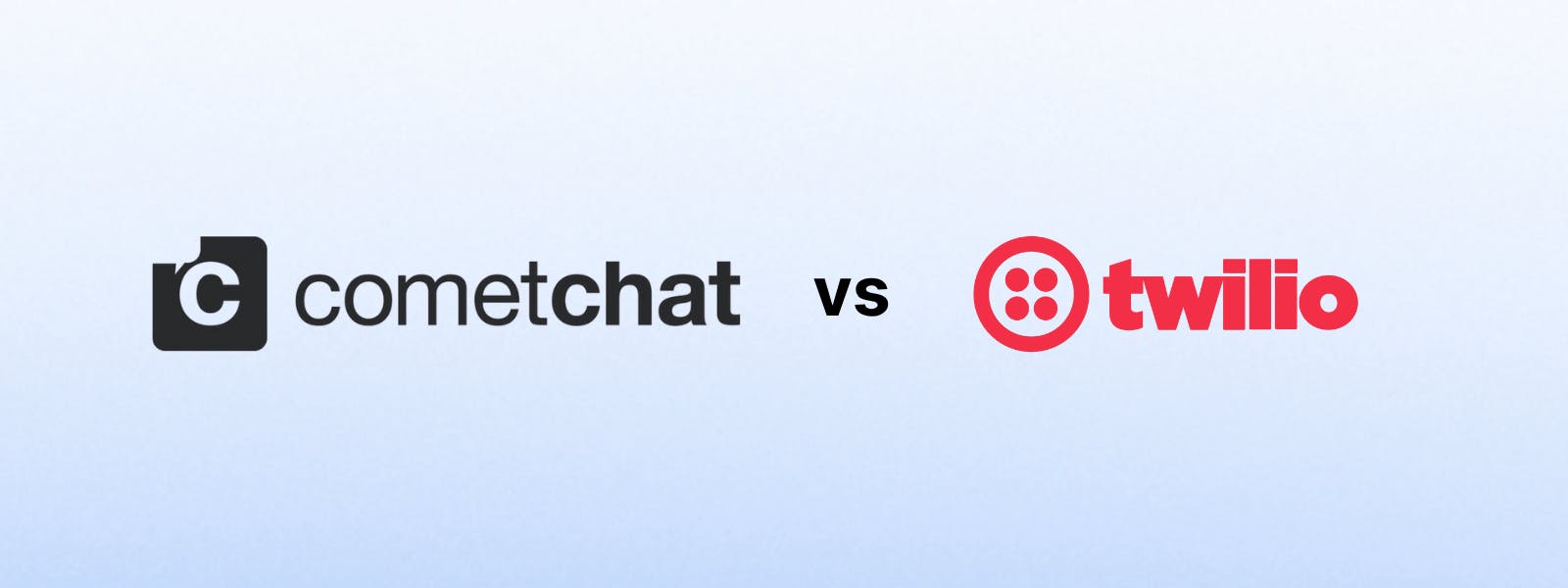
Twilio is a cloud communications platform known for its wide range of APIs across SMS, voice, email, and chat. Its Conversations API supports multi-channel messaging and is commonly used for customer support and engagement across industries like retail, healthcare, and logistics.
Twilio Versus CometChat
Twilio's Conversations API allows for 1:1 and group messaging across SMS, WhatsApp, and chat channels, making it ideal for customer support and omnichannel engagement. CometChat, by contrast, is optimized for in-app messaging with support for UI kits, voice and video calling, and a growing extension marketplace focused on vertical-specific needs.
Both platforms offer core chat features such as message history, file sharing, push notifications, and moderation tools. Each also meets security and compliance standards like HIPAA and SOC 2, making them viable options for healthcare and enterprise apps.
However, Twilio supports fewer SDKs—just seven—compared to Comet's 12 SDKs. Twilio also doesn't prioritize out-of-the-box features, which can slow down development for even basic chat functionality, nor native AI moderation, meaning developers must integrate third-party moderation tools.
Where Twilio stands out is infrastructure reliability. It offers a 99.95% uptime SLA and a transparent, usage-based pricing model. Comet, on the other hand, may be a better fit for teams looking for more out-of-the-box frontend tools and in-app engagement features.
Twilio Pricing
Twilio's pricing for chat and video is usage-based and varies by product.
Chat Pricing (Conversations API):
-
Usage: $0.05/ active user per month
-
Media Storage: $0.25/ GB per month
Video Pricing:
-
Video Calling: $0.004/ participant per minute
-
Participant Recordings: $0.004/ participant per minute
-
Recording: $0.004/ per recorded minute
CometChat vs. Arrowchat
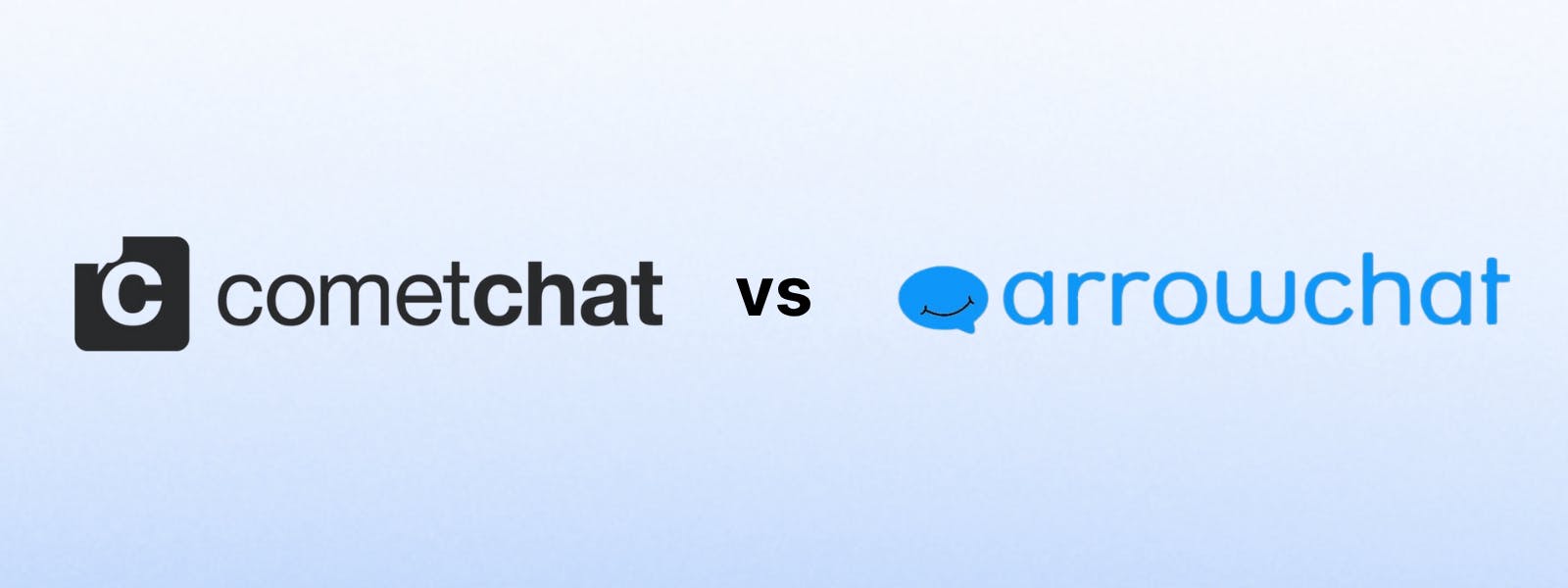
Arrowchat is a PHP-based chat script designed to add real-time messaging and video to websites. It integrates with popular content management systems and forums, making it a lightweight option for web apps that don't require mobile SDKs or advanced scalability.
Arrowchat Versus CometChat
ArrowChat includes core messaging features like private and group chat, file sharing, user presence, and admin moderation tools. It also now supports video chat, enabling basic face-to-face communication within web apps. These features are suited for forums, membership sites, and legacy platforms.
However, ArrowChat still lacks mobile SDKs, pre-built UI kits, AI-powered moderation, and cloud-native scalability, making it a less flexible option for cross-platform or enterprise applications. It also does not advertise HIPAA, GDPR compliance, formal SLA, or compliance certifications. In contrast, CometChat offers 12 SDKs across platforms, built-in video and voice support, and vertical-specific tools for education, healthcare, dating, and more.
Arrowchat Pricing
ArrowChat is sold on a one-time license pricing model.
-
Starter: $76
-
Premium: $156
-
Business: $316
All versions are self-hosted. Additional costs may apply for hosting, updates, or support services.
CometChat vs. Mesibo
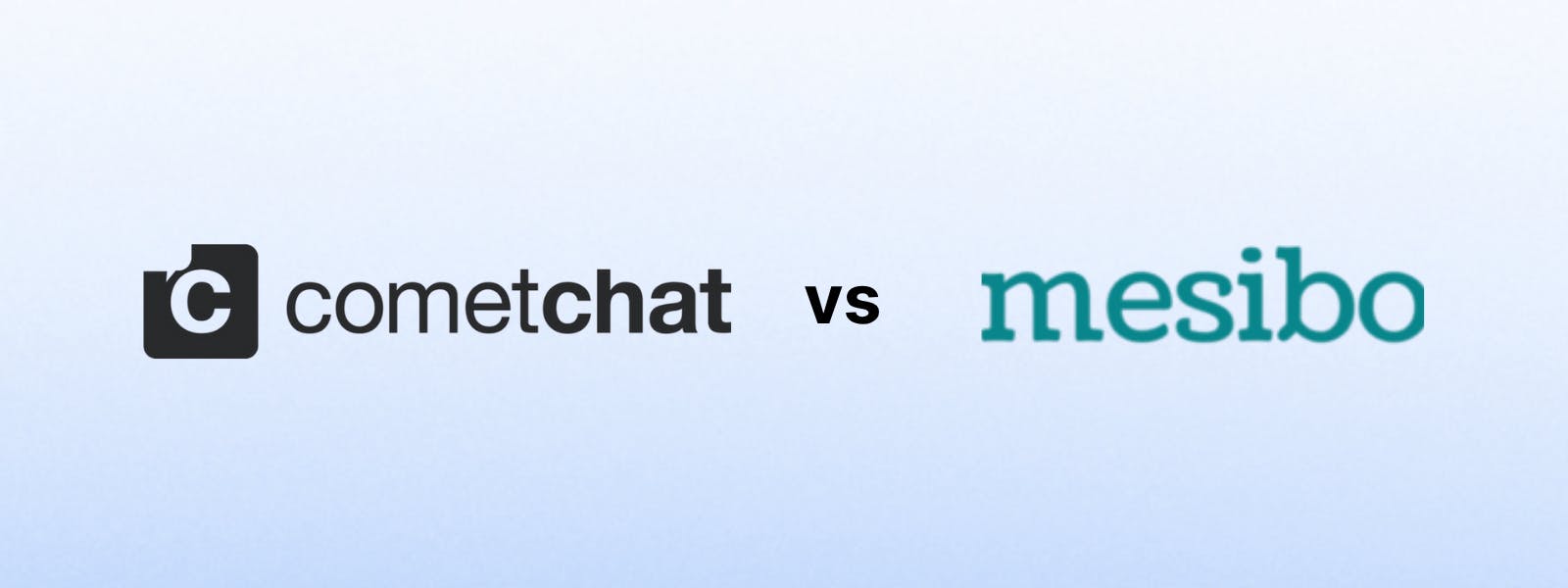
Mesibo is a real-time communication platform that provides APIs for chat, voice, and video. It supports both cloud and on-premise deployment, offering flexibility for teams that need complete control over infrastructure and data.
Mesibo Versus CometChat
Mesibo offers a full-featured messaging stack with support for 1:1 chat, group messaging, voice and video calls, end-to-end encryption, and push notifications. It provides SDKs for major platforms and allows developers to build highly customizable communication experiences. For teams with specific security or hosting needs, the option to run Mesibo on-premise is a major advantage.
Compared to CometChat, Mesibo focuses more on infrastructure-level flexibility than frontend convenience. It lacks no-code tools, comprehensive pre-built UI kits, and an extension marketplace—features that help teams ship faster with Comet. Mesibo also has less polished documentation and fewer out-of-the-box features for industries like dating, education, or telehealth.
Mesibo Pricing
Mesibo uses a pay-as-you-go model based on usage, including messages, calls, and storage. It also offers free usage for smaller apps.
CometChat vs. PubNub
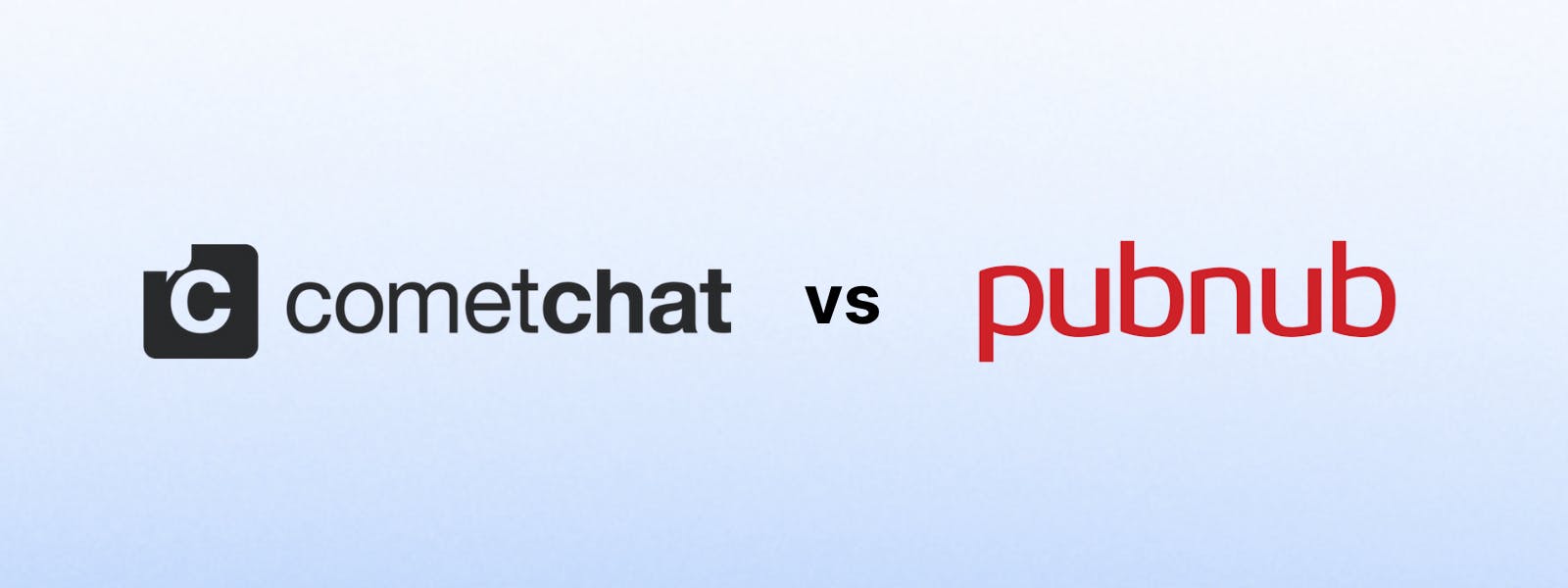
PubNub is a real-time communication platform built around its publish/subscribe messaging infrastructure. Originally designed for data synchronization, PubNub has since expanded its offering to include a chat SDK for apps needing custom real-time messaging capabilities.
PubNub Versus CometChat
PubNub offers a powerful foundation for building custom chat experiences, particularly for developers who want to control every layer of the messaging stack. Its SDKs support mobile and web platforms and include features like presence, message storage, access control, and basic moderation.
However, since it falls more into the real-time infrastructure category, PubNub's chat functionality requires more custom development than CometChat's prepackaged tools. It lacks robust chat UI kits, video functionality, and advanced AI moderation.
While PubNub is ideal for teams building chat as part of a broader real-time application (e.g., IoT dashboards or multiplayer games), Comet is better suited for teams focused on shipping chat, voice, and video quickly with minimal lift.
PubNub Pricing
PubNub offers tiered pricing plans based on monthly active users and feature access.
-
Starter: From $98/month
-
Pro: Contact Sales
CometChat vs. Ably
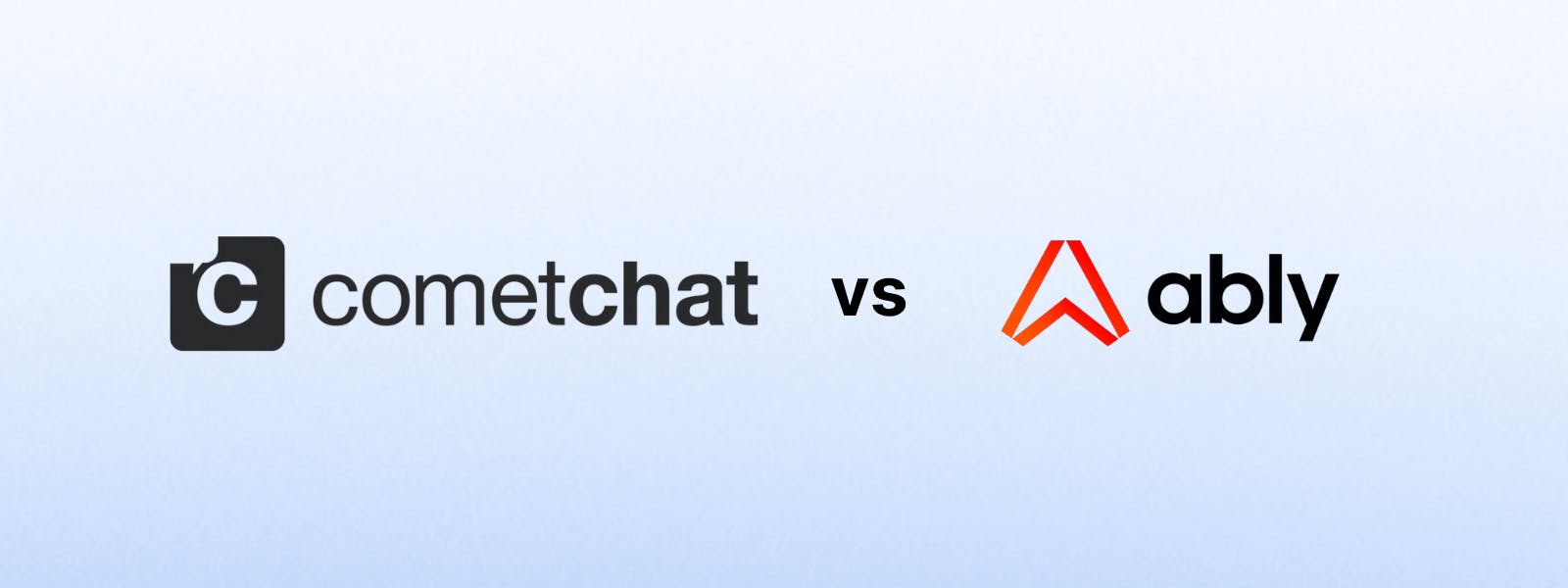
Ably is a real-time infrastructure platform that focuses on delivering low-latency, reliable messaging across global distributed systems. It's designed for developers building event-driven applications, including chat, but also supports broader use cases like live dashboards, GPS tracking, and collaborative tools.
Ably Versus CometChat
Ably offers robust real-time capabilities such as pub/sub messaging, presence, message history, and data synchronization. Its global edge network and fault-tolerant architecture are strengths for teams needing guaranteed message delivery and low latency across regions.
Ably also offers a 99.999% uptime SLA and is SOC 2 Type II and GDPR compliant. It supports regional message routing and encrypted payload delivery for sensitive use cases.
While Ably can be used to build custom chat applications, it doesn't provide out-of-the-box UI components, voice/video functionality, or industry-specific extensions. Developers must build the entire chat experience themselves. In contrast, CometChat is built specifically for chat and engagement, with SDKs, UI kits, moderation tools, and no-code options to help teams move faster.
Ably is a better fit for engineering-heavy teams building highly custom solutions, while Comet serves product teams focused on in-app user communication.
Ably Pricing
Ably uses a usage-based pricing model:
-
Standard: $29/month + consumption
-
Pro: $399/month + consumptions
-
Enterprise: Contact Sales
CometChat vs. Agora
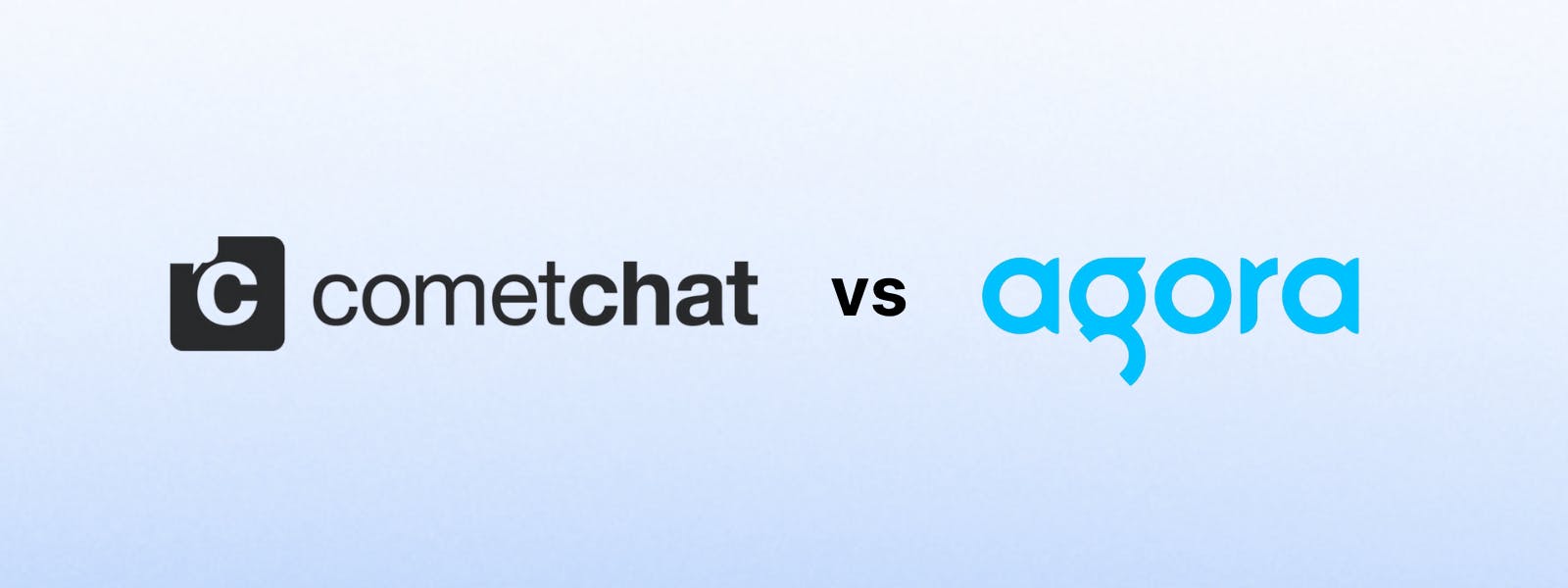
Agora is a real-time engagement platform known for its voice and video APIs. While it initially focused on audio and video infrastructure, Agora now also offers in-app messaging through its Chat SDK, making it a more complete communications solution.
Agora Versus CometChat
Agora Chat supports a wide range of industries—including gaming, social, education, and healthcare—with SDKs for all major platforms plus Windows. It offers reliable cross-platform messaging, rich media support, translation, user presence, and push notifications.
Compared to CometChat, Agora provides stronger infrastructure for real-time voice and video, especially at scale. However, Comet offers more out-of-the-box messaging features, prebuilt UI kits, and an extension marketplace that speeds up development. Comet is also more focused on in-app engagement use cases, while Agora leans toward media-rich, interactive experiences like livestreaming and virtual classrooms.
One key limitation of Agora is its lack of built-in moderation tools. Unlike Comet, which includes AI-powered moderation, profanity filtering, user blocking, and image moderation out of the box, Agora requires developers to integrate moderation functionality through Microsoft Azure Moderator.
Agora Pricing
Agora offers free usage up to a threshold and scales pricing based on MAU.
Chat Pricing:
-
Starter: Starts at $349/month for up to 5,000 MAU
-
Pro: Starts at $699/month for up to 10,000 MAU
-
Enterprise: Talk to Sales
Video Pricing:
-
Video HD: $3.99/ 1,000 minutes
-
Video Full HD: $8.99/ 1,000 minutes
CometChat vs. TalkJS
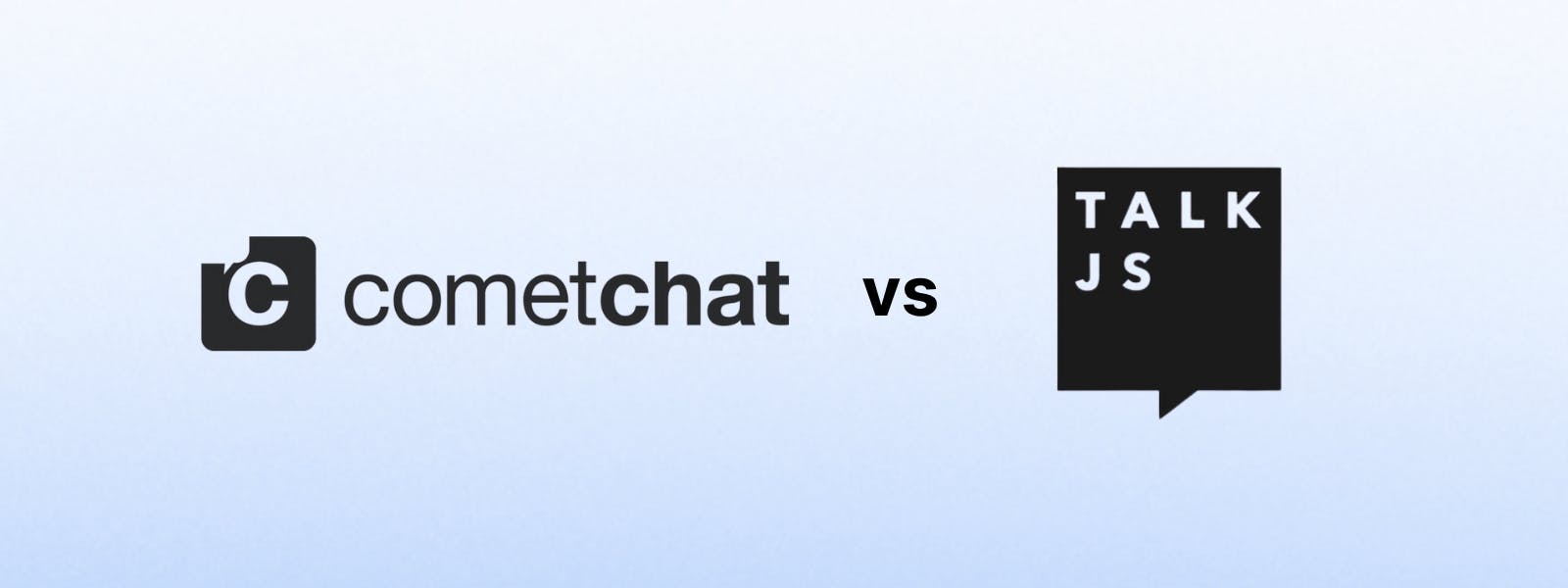
TalkJS is a chat API designed to help developers quickly add messaging features to web and mobile apps using a prebuilt UI and built-in notifications. It's tailored for platforms like marketplaces, education, hiring, and virtual events where chat is a feature, not the core product.
TalkJS Versus CometChat
TalkJS simplifies implementation by offering a fully styled UI and real-time messaging with just a few lines of code. It supports features like message history, file sharing, read receipts, and moderation, along with webhook-based integrations for backend workflows.
However, TalkJS supports only a limited set of SDKs—JavaScript, React, React Native, and Flutter—which may be restrictive for teams working in other environments. CometChat offers broader platform coverage with 12 SDKs, plus more advanced features like voice and video calls, conversation AI, moderation, and an extension marketplace.
While TalkJS is a solid choice for teams looking for a lightweight messaging layer with minimal configuration, Comet is better suited for developers building feature-rich, multi-platform communication tools.
TalkJS Pricing
TalkJS offers three pricing plans based on MAU and feature access:
- Basic: $279/month for 10,000 MAU
- Growth: $569/month for 25,000 MAU
- Enterprise: Custom pricing
CometChat vs. Vonage
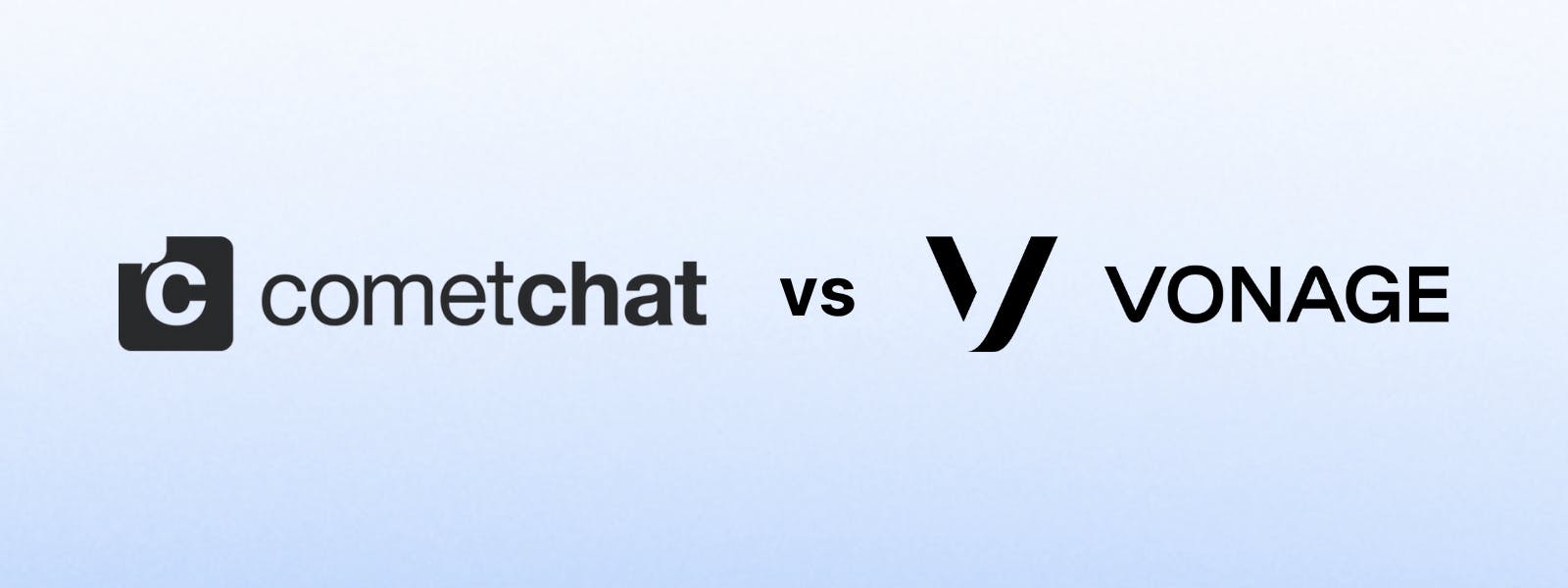
Vonage is a cloud communications provider offering APIs for voice, video, SMS, and messaging. Its Conversations API supports multi-channel communication and is used in industries such as healthcare, finance, and customer support.
Vonage Versus CometChat
Vonage provides a flexible, multi-channel communication stack, allowing developers to combine in-app messaging with voice, SMS, and social channels like WhatsApp. Its real-time messaging capabilities include group chat, message history, file sharing, and user presence.
Where Vonage excels is in omnichannel communication and infrastructure reach, with a 99.99% uptime SLA. However, its chat experience is more generalized compared to CometChat, which is purpose-built for in-app messaging, voice, and video. Comet also offers UI kits, no-code widgets, and industry-specific extensions that help teams launch faster without heavy frontend work.
Vonage may be the better fit if your app needs to coordinate messaging across multiple external channels. Comet is ideal for teams focused on user-to-user chat inside web and mobile apps, along with advanced moderation capabilities.
Vonage Pricing
Vonage offers usage-based pricing across its APIs.
-
Messages: Starting from €0.0011/ message
-
Video: Starting from €0.00382/ minute
Alternatives Comparison Chart
| Provider | Chat SDKs | Voice & Video | Built-in Moderation | UI Kits | Global Edge Network | HIPAA Compliance | SFU Cascading |
|---|---|---|---|---|---|---|---|
| CometChat | ✅ | ✅ | ✅ (Native AI + Custom Rules) | ✅ | ✅ (Multi-region) | ✅ | ❌ |
| Stream | ✅ | ✅ | ✅ (In-house AI) | ✅ | ✅ | ✅ | ✅ |
| Sendbird | ✅ | ✅ | ✅ (Native + AI via partner) | ✅ | ❌ (Single Region Choice) | ✅ | ❌ |
| Agora | ✅ | ✅ (Core Strength) | ✅ (Via Partner, e.g., Azure, ActiveFence) | ✅ (Chat UIKit, App Builder) | ✅ (SD-RTN™) | ✅ | ✅ |
| PubNub | ✅ | ✅ (Partial - Signaling, V&V via Integrations) | ✅ (Partial - Basic Native + Advanced via Integrations) | ❌ (Templates/Unsupported) Components) | ✅ | ✅ | ❌ |
| Twilio | ✅ (Conversations API) | ✅ | ✅ (Admin controls; Content mod. via AI tools/custom) | ✅ (Quick Deploy Apps & UI Kits) | ✅ | ✅ | ❌ |
| TalkJS | ✅ | ❌ (Voice Messages only) | ✅ (Basic to Intermediate Native) | ✅ (Pre-built, Customizable) | ✅ (90+ regions) | ❌ | ❌ |
| ArrowChat | ❌ (PHP Script) | ✅ (Via 3rd Party Integrations) | ✅ (Manual/Admin) | ❌ (Themes/Templates) | ❌ (Self-hosted) | ❌ | ❌ (Depends on integrated V&V service) |
| Mesibo | ✅ | ✅ | ✅ (Manual + Profanity Filters) | ✅ (Open-source UI Modules) | ✅ (Global Presence, Regional Servers) | ✅ | ❌ |
| Ably | ✅ (Infra-focused) | ❌ | ✅ (Via Hive or AWS Lambda) | ❌ | ✅ | ✅ | ❌ |
| Vonage | ✅ (Client SDKs) | ✅ (Core Strength) | ✅ (Admin controls; Content mod. via AI integration) | ✅ (UI Web Components) | ✅ (Global Platform) | ✅ | ❌ |
Is CometChat Right For You, Or Did You Find An Alternative?
The ten CometChat alternatives covered above offer strong options for teams building real-time communication into their apps. Some platforms, like TalkJS or PubNub, are best for lightweight use cases or apps where chat is a secondary feature. Others, like Stream, Agora, or Vonage, offer broader functionality across messaging, voice, video, and multi-channel engagement.
Depending on the features that are important to you, your budget, and your use case, CometChat might not be the best solution. We suggest taking advantage of the competitors above who offer a free trial or tier, like Stream. You'll want to test out a proof of concept project before committing to any big decisions, but you can always easily migrate away from CometChat if you need to pivot.

